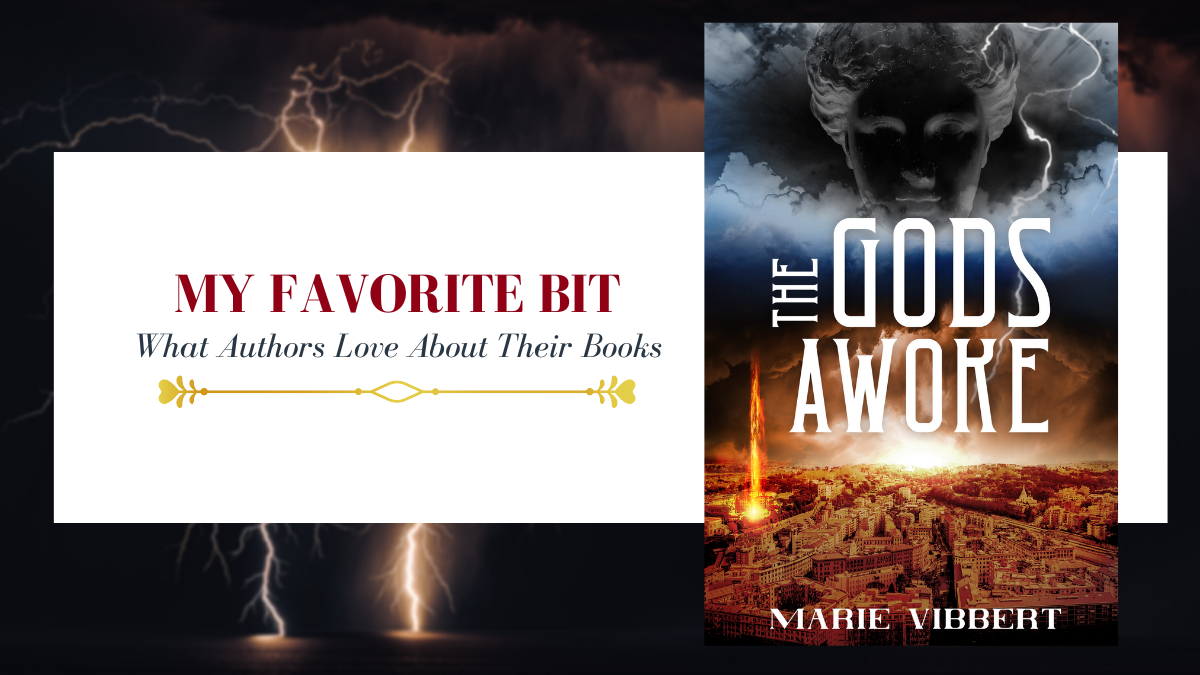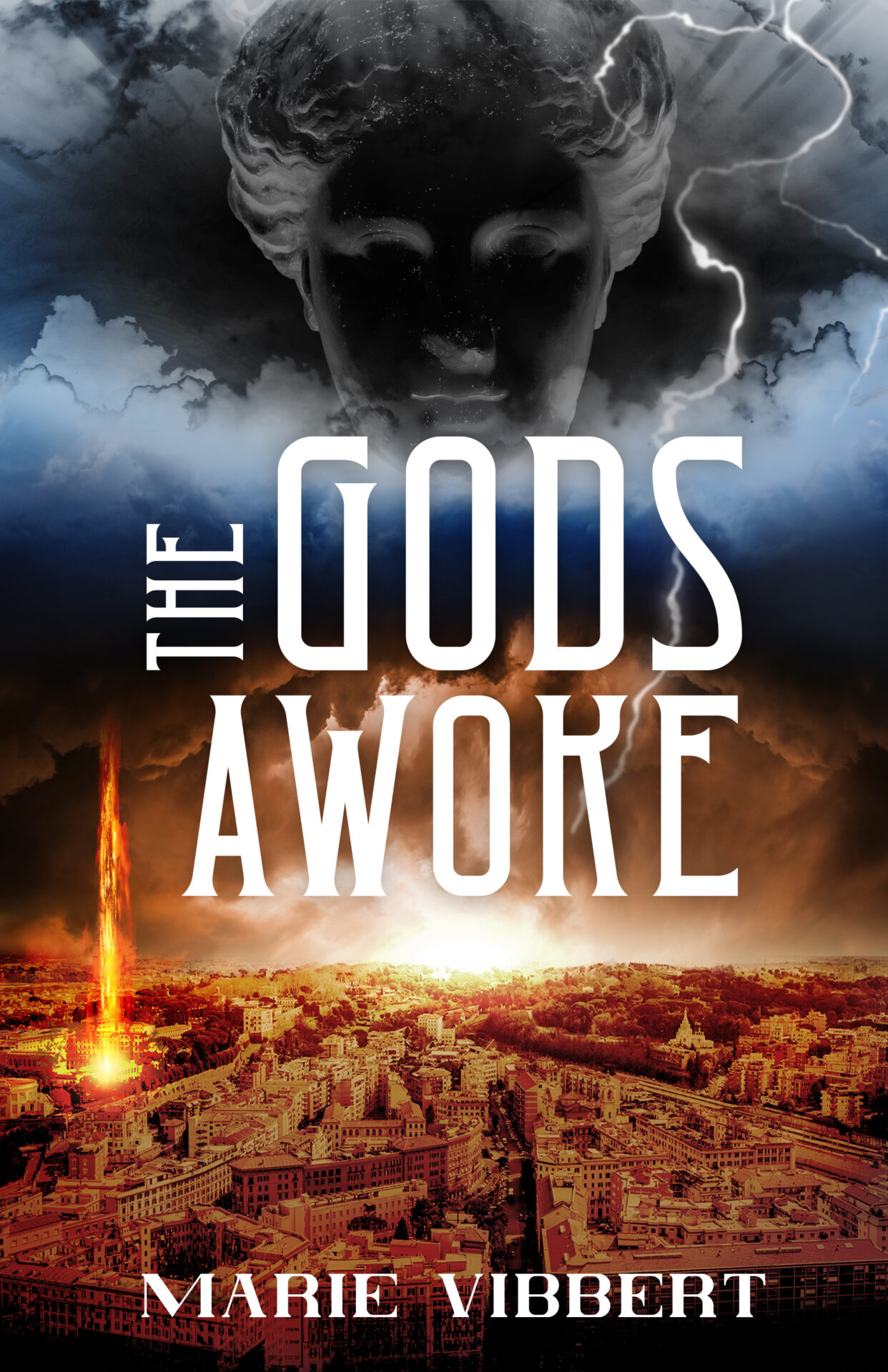
Marie Vibbert is joining us today to talk about her novel, The Gods Awoke. Here’s the publisher’s description:
If the Gods were real, could you believe?
Hitra, high priestess of Revestre, already has enough on her hands: political upheaval, a distractingly attractive male servant, and an upcoming harvest festival. But when a column of flame from the heavens sends a city into tumult, it upends more than just her schedule. Now, Hitra must deal with a religious schism, ethnic strife…and a God growing out of control.
What’s Marie’s favorite bit?

MARIE VIBBERT
My favorite bit in The Gods Awoke is the narrative point of view. Let’s go back a bit to explain…
In 2004, I was coming off a long stint of difficult, low-paying jobs, having finally landed a difficult, but above-minimum job. I’d just gotten married, and signed a mortgage, and I still had student loans. My dream of being a writer felt farther away than ever. I’d stopped sending out short stories, and I’d abandoned science fiction to write smutty fantasy stories I had no intention of publishing, to ease my stress.
Fortunately, my job was at a university. I could take free courses, and there was one called Writing the Novel. I signed up.
In my journal, I spent the first two weeks of the class struggling to come up with an idea for a novel, and then, having selected it, I just couldn’t get started. Had I lost whatever it was that let me write long novels all through high school and college? Then on January 27, 2004, I wrote:
“My opening scene doesn’t work. It’s too dramatic to carry the weight of introduction. I need something slower, less important, and with a quiet undertone of sexual frustration. … Narration. The P.O.V… who is narrating this? Oo… could I use first person omniscient? There are gods, after all. Re-write with Senne, the evil goddess of power, as the point-of-view character!”
After 14 pages of nothing but frustration and complaints, unable to find a toehold into the novel and write, the very next page of the diary contains passages of draft fiction: “He caught my intention, because he talked, with his mind and voice at once, and he stood while the ones he was with sat. [Yeah! Written on a line by itself.] Two women, bodies sweaty under their ponderous clothes, one is Hitra, a priestess, and she stretches her legs under the table and thinks about undressing, about, maybe, undressing him.”
This is close to the actual first scene: “The young man, Illoe, caught my attention first. He stood on a threshold, an archway between two rooms, with a tray in his hands and two emotions pushing at each other in his mind. It was this tension which fascinated me. He wasn’t aware, of course, that I was there.
“Two women sat at a table near him, also unaware of me….”
I remember the rush of productivity after I made this choice to set the goddess as the point-of-view. There was suddenly so much to write! It got me to really inhabit the scenes in my mind, to slow down to consider every character. Including all the thoughts in a scene made me love writing again at a point in my life when I feared I’d never write again. So, we have Illoe, thinking about a problem he needs to talk to his boss about, and his boss, thinking about how to get out of this meeting, and the donatrix, thinking about levying fines for abuses of gardening. And Illoe has complicated feelings for his boss, who has complicated feelings about him, and even the donatrix, Maede, has complicated feelings about the both of them, although she is not that intimate with them. Everyone has something they want to say, and something they want to leave unsaid.
Oh, and they are all telepaths, to add another level of fun. Senne hears all of their thoughts. Hitra can hear almost every thought in her vicinity and has to avert her internal eye; Illoe can only hear words pushed directly at him. Maede can catch whiffs of emotion but no context. The higher-powered women can easily pass notes to each other, but Illoe can tell when someone is distracted by such “whispers.”
When I tried to pick a favorite scene in the book, it came up a tie of all the little scenes of tight personal drama like this, where two or more characters struggle between the unsaid and the said, the thought-layers and the word-layer. Like when Illoe visits his parents, and his father feels unappreciated and his mother wants to avoid conflict, and all the things they say and don’t say to each other are on display, a picture of the burden of history, of wanting and demanding, that color family interactions.
It was hard to maintain the balanced third/ omniscient point of view. When I presented my first draft chapter to my writing workshop, Maureen McHugh slayed me with a polite, “Let me guess what I think you’re trying to do here…”
I revised a lot, to remember to include the casual thoughts of the woman on the street corner who isn’t even in the story, because she was there. I had to remember this was first person omniscient, to reason out why the goddess-narrator was in each scene. Above all, I had to pick and choose details so that the reader wasn’t bogged down by too much omniscience. It was the challenge that kept me coming back to this story, even eighteen years after I wrote the first draft. I hope it’s as enjoyable to read as it was to write.
LINKS:
The Gods Awoke Universal Book Link
BIO:
Marie Vibbert has sold over 80 short stories to places like Nature, Analog, and F&SF. Her work has been translated into Vietnamese and Chinese, and has been called …the embodiment of what science fiction should be… by The Oxford Culture Review. Her debut novel, Galactic Hellcats, was longlisted by the British Science Fiction Association for 2021. By day she is a computer programmer in Cleveland, Ohio.Marie is also a member of the Science Fiction Poetry Association, SFPA. She was nominated for their Rhysling Award in 2015, 2021, and 2022, won second place in the Hessler Street Fair poetry contest, and once sold a rhyming poem to a magazine that had no rhyming poetry in their guidelines.
